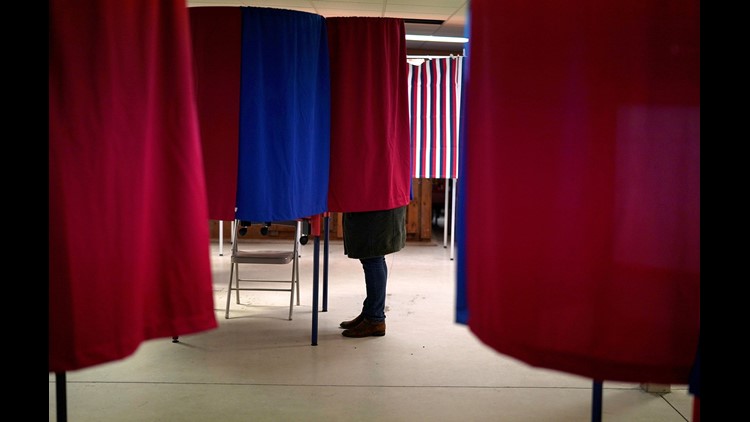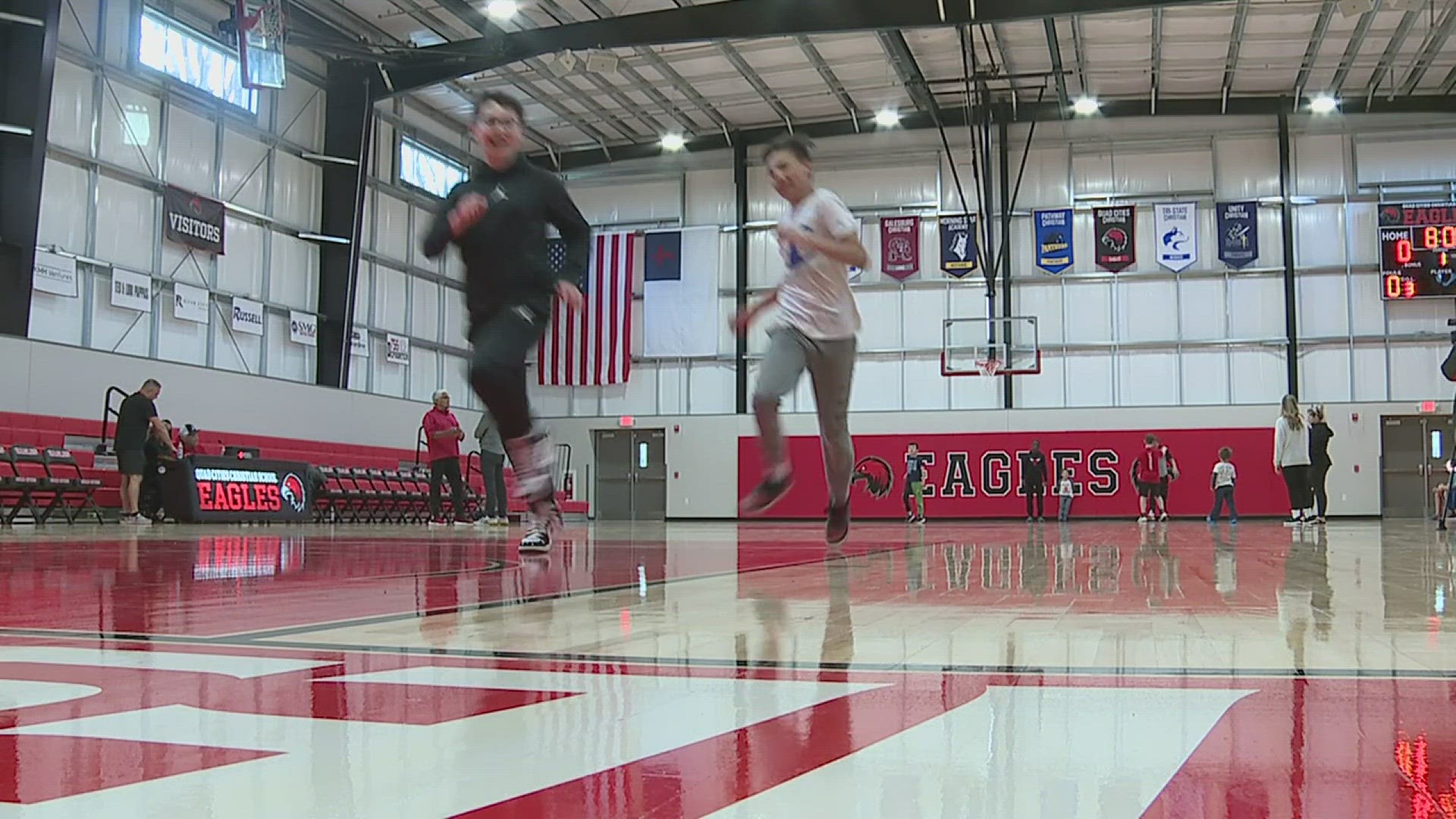(CNN) — Vermont Sen. Bernie Sanders and Pete Buttigieg were once again locked in a tight race as results trickled in Tuesday night in New Hampshire’s first-in-the-nation primary.
As the senator from a neighboring state, Sanders was expected to do well in the Granite State, where he beat Hillary Clinton by 22 points in the 2016 Democratic primary.
But Buttigieg, who won the Iowa caucuses last week, appeared to be once again outpacing expectations.
New Hampshire, famous for its mercurial voters and for breathing new life into struggling candidacies, was also poised to reorder the race with many voters backing Minnesota Sen. Amy Klobuchar, one of the more moderate candidates in the race who is running on her proven ability to win swing voters in the Midwest.
Both Klobuchar and Buttigieg appear to have been buoyed by the large number of independent voters in the state — who are permitted to vote in either party’s primary.
Early results indicate that New Hampshire became another stumbling block for both Massachusetts Sen. Elizabeth Warren and former Vice President Joe Biden, who has drawn small crowds in recent days and made the telling decision to abruptly abandon his election night party in favor of heading to South Carolina.
With 81% of precincts reporting, Sanders led with 26.1%. Buttigieg was in second with 24.2% and Klobuchar in third with 19.9%. It was a steep dropoff to fourth place for Warren, who had 9.4%, and Biden in fifth, with 8.5%. Warren and Biden will not win any delegates in Tuesday’s race, according to a CNN Decision Desk analysis.
CNN is estimating Sanders has so far earned eight delegates on Tuesday. Buttigieg has earned seven and Klobuchar has six. There are 24 delegates at stake.
A source says that as returns come in the Buttigieg campaign has its eyes on the suburbs, where he’s been performing well.
“This was Bernie’s backyard,” the source told CNN, adding, “and we’re right there.”
CNN is projecting President Donald Trump will easily win the state’s Republican primary, as expected.
Klobuchar surprises with strong showing
The first hints of a good night for Klobuchar came shortly after midnight on Tuesday when voters from three tiny towns in northern New Hampshire cast their ballots.
Though the three towns — Dixville Notch, Hart’s Location and Millsfield — comprise a tiny portion of the votes, Klobuchar led the field with eight votes. Former New York Mayor Michael Bloomberg — who isn’t even on the New Hampshire ballot because he’s competing in later primary states — received two write-in votes on the Democratic side.
As results came in, Klobuchar touted her “happy, scrappy campaign” and told her supporters in New Hampshire that their effort had “beaten the odds every step of the way.” She called the election a “decency check” and a “patriotism check” and said that the election would prove that “the heart of America is bigger than the heart of this guy in the White House.”
“Tonight is about grit and my story, like so many of yours, is one of resilience,” Klobuchar said. “I announced my candidacy in the middle of a Minnesota blizzard. And there were a lot of people that predicted I wouldn’t even get through that speech, but not the people of my state, and not the people of New Hampshire. Except, then they predicted that we wouldn’t make it through the summer. We did. Then they predicted we wouldn’t make it to the debates and Man, were we at the debate in New Hampshire.”
“What we’ve done is steady,” the Minnesota senator continued. “We’ve been strong and we’ve never quit. I think that sounds pretty good for a president. Across the months, and months, and miles of this race, we redefined the word grit.”
She alluded to one of the biggest hurdles in the Democratic race for the female candidates — the fact that a large portion of voters still worry that a female nominee would face a deeper climb against Trump than a male candidate. The exit polls in New Hampshire Tuesday night bore that out. Thirty percent of voters polled said they believe it would be harder for a woman to beat Trump, while 11% said it would be easier. Fifty-eight percent said there would be no difference.
Klobuchar said people have told her, just like they have told Warren, that “they didn’t think a woman could be elected.”
“In my case, it was elected to the US Senate; no woman had ever done it before,” Klobuchar said. “But I came back. I defied expectations and I won. And I have done it over and over again in the reddest of red districts and the bluest of blue districts. … And tonight in New Hampshire, as everyone had counted us out, even a week ago — thank you, pundits — I came back, and we delivered.”
Tough night for Warren and Biden
Biden hopes to draw attention to the Palmetto State, which his advisers have called his firewall, as a state that can prove that his strong support among African American voters can carry him to the Democratic nomination.
Warren took the stage early in Manchester, New Hampshire, to congratulate Sanders and cast herself as the unity candidate, noting that Biden, Buttigieg and Sanders have all been targeting one another over the past week.
“These harsh tactics might work if you’re willing to burn down the rest of the party in order to be the last man standing,” Warren said. “But if we’re going to beat Donald Trump in November, we are going to need huge turnout within our party, and to get that turnout, we will need a nominee that the broadest coalition of our party feels they can get behind. We can’t afford to fall into factions. We can’t afford to squander our collective power. We will win when we come together.”
As Biden and Warren sought to recalibrate their campaigns, businessman Andrew Yang and Colorado Sen. Michael Bennet both dropped out of the race after results began coming in.
According to CNN’s tracking poll, many voters were still undecided in recent days — only about half of likely primary voters said they had made a final decision on their candidate. CNN’s tracking poll was conducted by the University of New Hampshire Survey Center.
Warren, who finished third in Iowa, had been expected to do well in New Hampshire given that she represents a neighboring state. But, in a memo shared with her supporters, her campaign manager Roger Lau signaled that her campaign was also looking beyond the New Hampshire results for a comeback.
In a fundraising email, he emphasized that the campaign has plans “to organize in all 57 states and territories” and highlighted that “there is no candidate that has yet shown the ability to consolidate support.”
“As we’ve seen in the last week, debates and unexpected results have an outsize impact on the race, and will likely keep it volatile and unpredictable through Super Tuesday,” Lau wrote in the memo.
Biden, who finished fourth in Iowa, dismissed predictions of his demise during a visit to a polling location in New Hampshire on Tuesday morning. He explained his leap ahead to South Carolina by saying there are still “significant portions of the electorate who haven’t voted yet,” a reference to the more diverse contests that will occur over the next month including Nevada, California and North Carolina.
Biden addressed New Hampshire supporters via livestream before joining his election night party in South Carolina.
“We just heard from the first two of 50 states,” Biden told the crowd in South Carolina. “Where I come from that’s the opening bell, not the closing bell. The fight to end Donald Trump’s presidency is just beginning.”
In a nod to the lack of minority support for two of his key rivals, Buttigieg and Klobuchar, Biden emphasized that African American voters have historically played an outsized role in selecting the nominee of the Democratic Party.
“We need to hear from Nevada, South Carolina and Super Tuesday states and beyond. Look we’re moving into an especially important phase (of the race), because up until now, we haven’t heard from the most committed constituency in the Democratic Party — the African American community — and the fastest growing segment of society — the Latino community,” Biden continued. “Ninety-nine point nine percent — that’s the percentage of African American voters who have not yet had a chance to vote in America.”
A traditional proving ground
Despite its first-in-the-nation primary status, New Hampshire has not has not always been predictive of the presidential nominee.
Former Presidents George W. Bush and Barack Obama, along with 2016 Democratic presidential nominee Hillary Clinton, lost New Hampshire but went on to win the nomination.
On the flip side, the state has given new life to struggling candidates. Though Bill Clinton lost New Hampshire in 1992 to then-Massachusetts Sen. Paul Tsongas, his surprise second-place finish allowed him to claim the mantle of the “Comeback Kid.”
Hillary Clinton was in deep trouble after Obama’s surprise victory in Iowa in 2008, where she came in third. But after making a big push in New Hampshire, she beat Obama with a three-point-margin, breathing new life into her campaign.
In the 2016 primary, Sanders ran strong along the Vermont-New Hampshire border, but he has tried to expand his sphere of support this cycle, particularly targeting new voters, working class voters and voters of color.
For many months, Sanders and Warren have been vying for younger voters in the towns in and around Durham, the home of the University of New Hampshire, near the state’s Seacoast.
One key test for Warren is how she fares in the southern portion of New Hampshire, which is the most populous area of the state and a region that is now home to many former Massachusetts residents. An inability to show strength next to her home state could create even more headaches for her already flagging campaign.
That southern band of the state is an area that is rich in independent votes, with some Massachusetts transplants moving across the border seeking lower taxes in New Hampshire.
Some of those fiscally conservative voters may be quicker to embrace the more pragmatic messages of Buttigieg or Klobuchar, if they are skittish about the price tag of the “Medicare for All” option, for example.
Overall exit polls showed that 6 in 10 Democratic primary voters said they would support a government plan like Medicare for All, while 4 in 10 opposed it.
Early exit polls, however, reflect the ideological flexibility of Democratic voters this year at a time when many of them are most focused on beating Trump. Six in 10 Democratic primary voters said they were more focused on finding a candidate who could beat Trump, than finding one who agreed with them on the issues.
This is a breaking story and will be updated.



